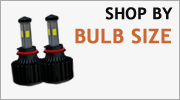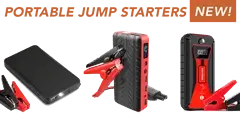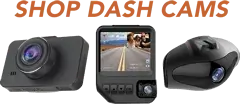
- 1.800.834.8669
- LIVE Chat Support
You have no items in your shopping cart.
Headlight Bulb Types - What Are They and Which is Best?
What are the different headlight bulb types? Understanding which bulb type your car has and which is the best.
Last updated: September 15, 2023
In this guide, we explore the 3 main types of headlight bulbs, how they work, which is the best, and which you should choose. We'll also give you tips and tricks on how to determine which type of headlight bulb your vehicle has.
If you're looking for information on the different types of headlight assemblies, check out this guide.

Headlight Bulb Types
There are 3 different types of headlight bulbs that dominate the automotive market:
- Halogen bulbs
- LED bulb
- HID (xenon) bulbs

Whether you drive a car, pickup truck, SUV, motorcycle, snowmobile, motorhome, or ATV, your vehicle is equipped with at least one of these three bulb types.
Looking at the 3 types side-by-side, we see that halogen is the oldest and worst technology while LED is the best and latest.
| Type | Brightness | Lifespan |
| Halogen | Low | Short |
| LED | Brightest | Long |
| HID | Bright | Medium |
Halogen Headlight Bulbs
Halogen headlight bulbs are the most common bulb type on the road, especially for older vehicles.
As the oldest type of headlight bulb, it uses technology that dates back to the invention of the light bulb. Its design consists of a metal filament enclosed in a glass tube, which produces light when heated.
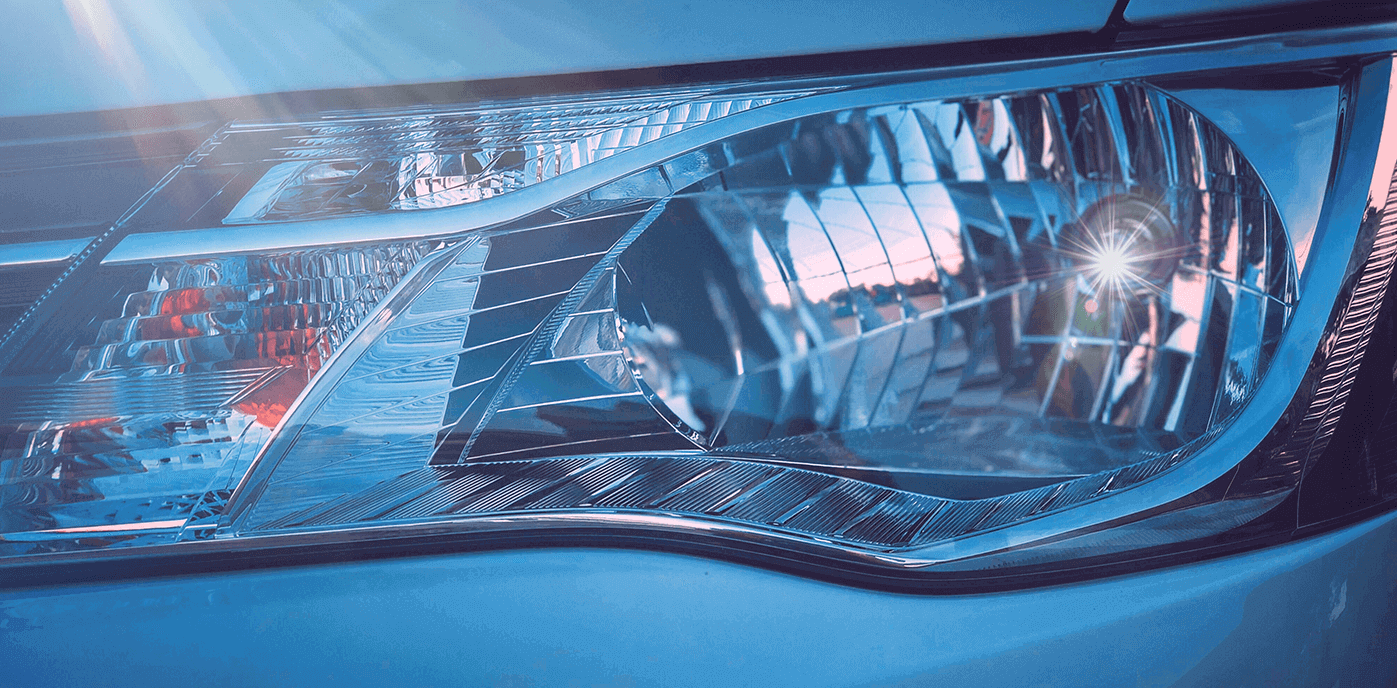
Although this type of bulb has served the automotive world for years, it has its limitations when it comes to energy efficiency, brightness, and life expectancy.
In fact, many drivers consider their lack of brightness outright dangerous and often swap them out for brighter LED or HID bulbs.
Pros
- Easy to replace
- Not expensive ($20 to $80 per pair)
- Low glare
- Can be upgraded to LED or HID bulbs
Cons
- Very dim
- Short life expectancy (6 to 12 months)
- High energy consumption
- Dull yellow color
- Fade over time
LED Headlight Bulbs
LED headlights are quickly taking over the automotive world due to their incredible brightness, long lifespan, and high energy efficiency.
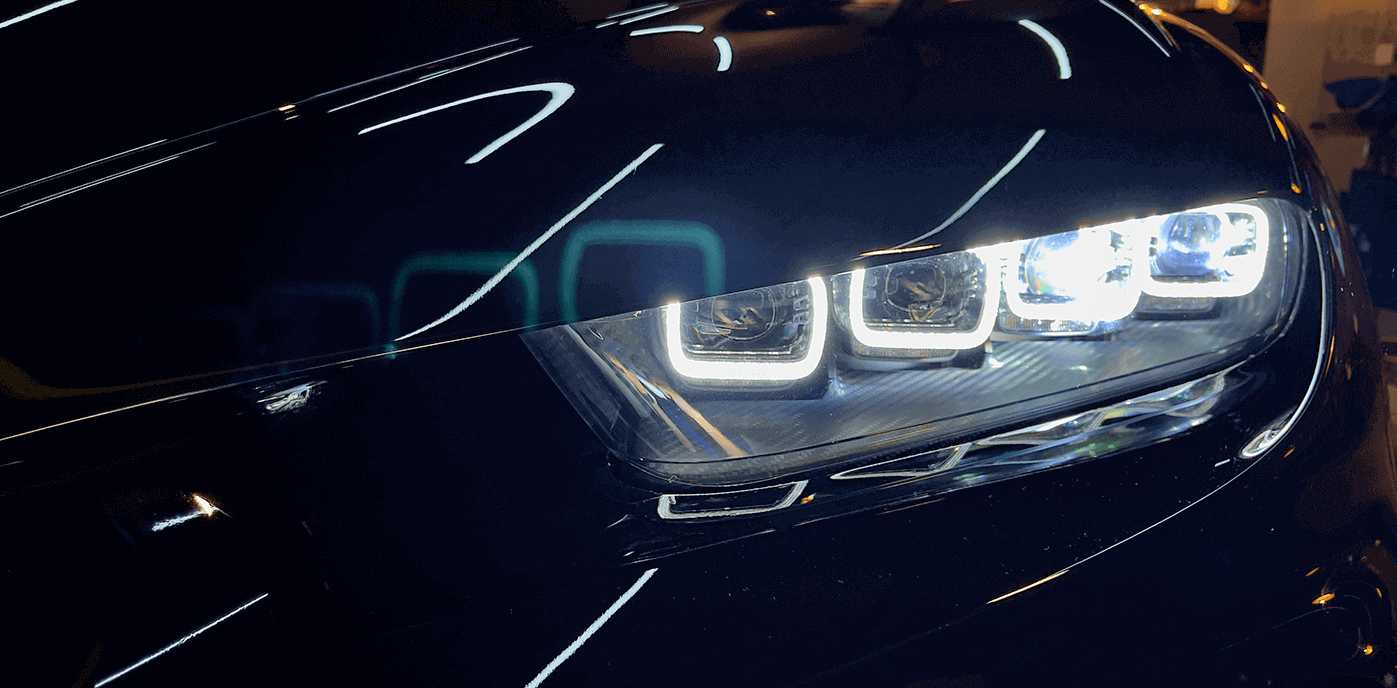
LEDs produce a powerful light by charging a semiconductor chip with electricity until it glows.
Most newer vehicles and almost all luxury vehicles now come equipped with factory LED headlight bulbs integrated directly into the assembly.
Luckily, vehicles equipped with halogen bulbs are able to upgrade to LED headlight bulbs designed specifically for halogen systems, such as our XenonPro LED headlights.
Pros
- Very bright
- Long lifespan (2 to 10 years)
- Bright white color
- High energy effeciency
- Do not fade over time
- Low glare
- Can be fitted in halogen system
Cons
- Expensive to replace factory LEDs
- Factory LEDs can only be serviced at dealer
- Aftermarket LEDs may not be suitable for all vehicles

HID (Xenon) Headlight Bulbs
Before LEDs became popular, HIDs were quickly taking over luxury vehicles and becoming the go-to aftermarket bulb upgrade.
The technology is similar to halogen but uses gas and other improvements to produce a much brighter light with improved energy efficiency and durability.
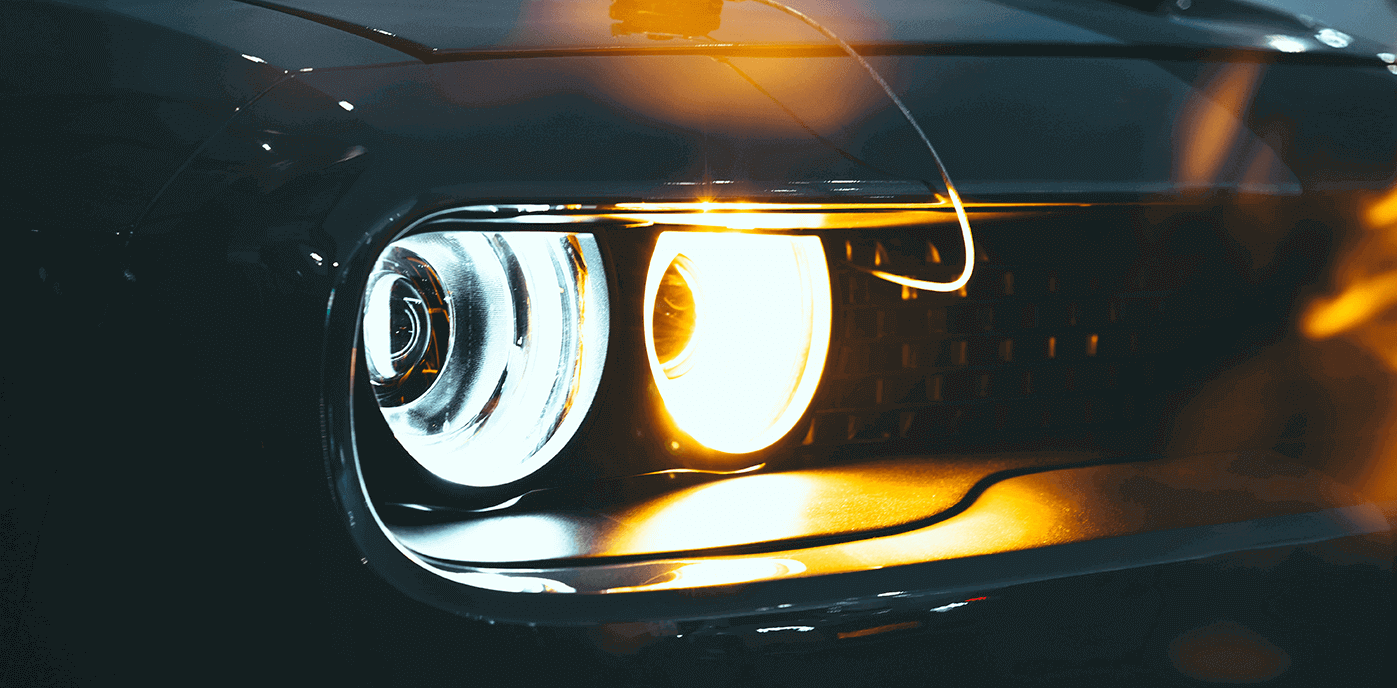
Certain vehicles continue to be produced with HID bulbs but the trend seems to suggest that they will eventually be phased out and replaced with LEDs.
HIDs continue to be a popular bulb type for drivers looking to upgrade their halogen headlights using products like our XenonPro HID headlights.
Pros
- Very bright
- Reliable lifespan (2 to 5 years)
- Variety of colors
- Energy effecient
- Can be fitted in halogen system
Cons
- High glare
- Expensive to replace factory HIDs
- Complicated to replace
- Fade over time
- Many components (bulbs, ballasts, ignitor)
- Aftermarket HIDs may not be suitable for all vehicles

Best Headlight Bulb Type
When comparing halogen, LEDs, and HIDs, it's clear that LED is the best headlight bulb type for several reasons.
Compared to its peers, LEDs are the brightest, the most energy efficient, and have the longest lifespan, which are the three most important factors drivers look for in a headlight bulb.
They also produce very little glare to oncoming traffic, don't fade over time, and can be fitted in most vehicles with halogen systems.
Learn how you can upgrade your headlights from halogen to LED or HID
What Headlight Bulb Type Do I have?
Whether you need to change your headlight bulbs, wondering if you can upgrade to brighter bulbs, or simply curious to know which type of bulb you have, you're in the right place.
There are several ways of finding out which type of headlight bulbs your vehicle uses:
Check your owner's manual
Typically found under the Maintenance section near the end of the manual, you will typically find a table summarizing all the bulbs your vehicle uses, including the headlights.
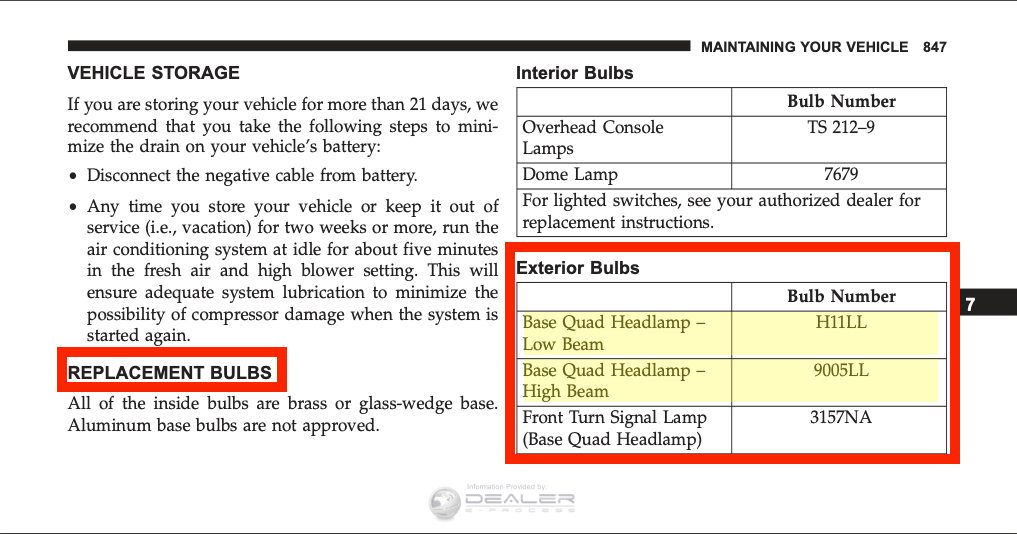
If your vehicle has factory LEDs, it will say so directly in the manual. You won't see a bulb reference number because the LEDs are integrated within the assembly and you'll need to visit an authorized dealer to have them fixed or replaced.
If your vehicle has factory HID headlight bulbs, you will see one of the following bulb sizes: D1S, D1R, D2S, D2R, D3S, D3R, D4S, D4R, or D5S.
If your vehicle has factory halogens, you will see all other bulb sizes such as H4, H7, H11, H13, 9003, 9005, 9006, 9008, etc.
In some cases you will see two options
Pull your bulb
If you are able to pull your headlight bulbs, it implies you have halogen or HID bulbs. If you cannot find a bulb to pull, you likely have LEDs.
If your vehicle has factory HID headlight bulbs, you will see one of the following bulb sizes: D1S, D1R, D2S, D2R, D3S, D3R, D4S, D4R, or D5S.
If your vehicle has factory halogens, you will see all other bulb sizes such as H4, H7, H11, H13, 9003, 9005, 9006, 9008, etc.
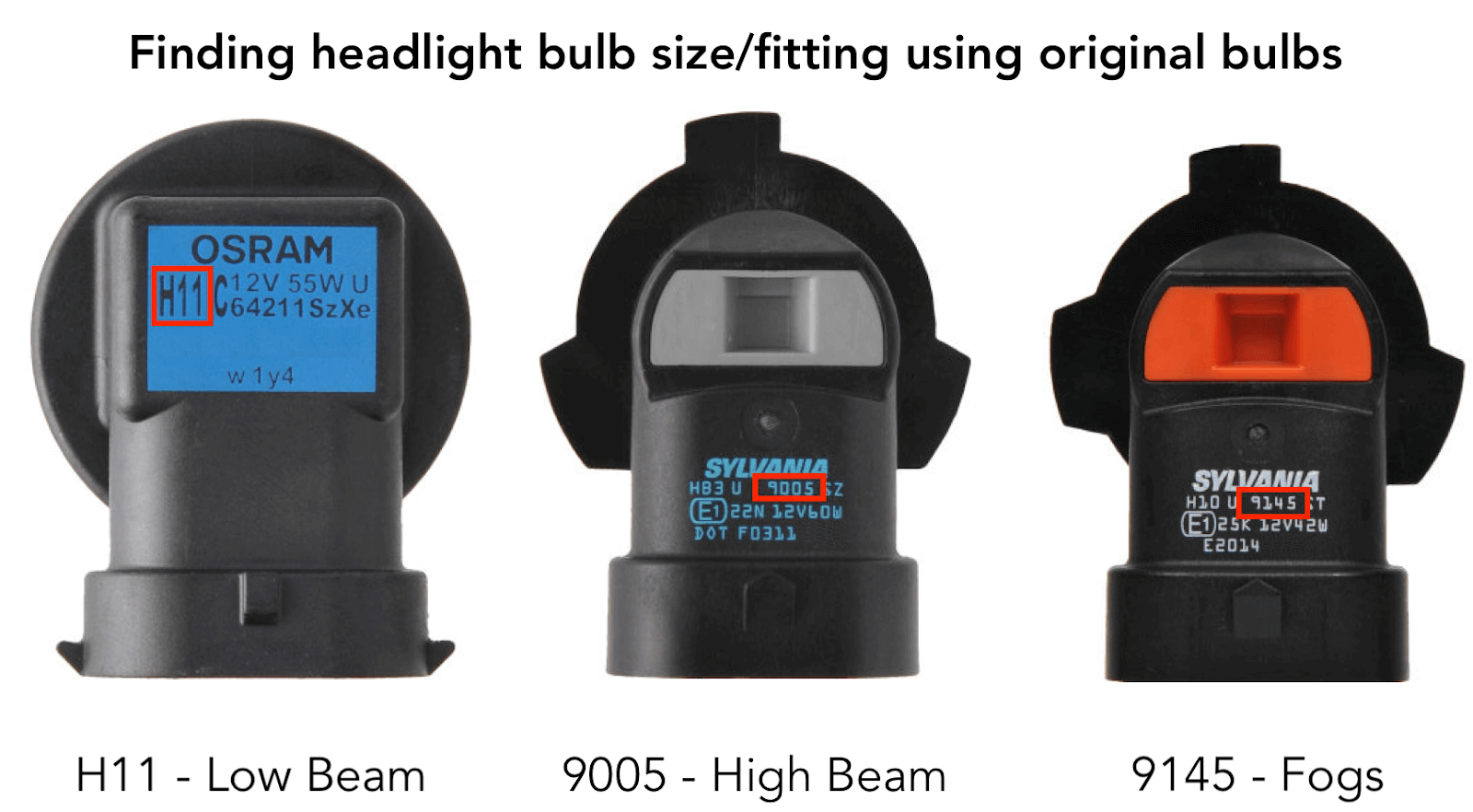
For more information on this topic, check out our guide to finding the right bulb size for your vehicle.
Call the dealership
Another option is to contact your dealership and ask them what type of bulbs your vehicle uses. Having your VIN number handy could help expedite the process.
Make sure to ask for the low beams (dims) and high beams (brights) as they might use different types.
Visit a mechanic
Last but not least, you can go visit a mechanic and ask them. They should be able to tell you fairly quickly by simply looking at the vehicle or by pulling the bulb.
Considerations When Choosing Headlight Bulbs
Before choosing a type of headlight bulb, there are a few things to take into consideration.
Compatibility - It's important to know what bulb type your vehicle uses and if changing bulb types is possible. If your vehicle has HIDs, for example, you won't be able to use halogens or LEDs.
Budget - If you're looking to change or upgrade your bulbs it's important to know the cost. LEDs and HIDs will cost at least two times more than halogens upfront even though they will save you money in the long run.
Objective - If your objective is to get brighter lights, you should be looking to upgrade to LED or HID. If this is just an old winter beater you plan to get rid of in just a few months, you're probably better off buying simple replacement bulbs.
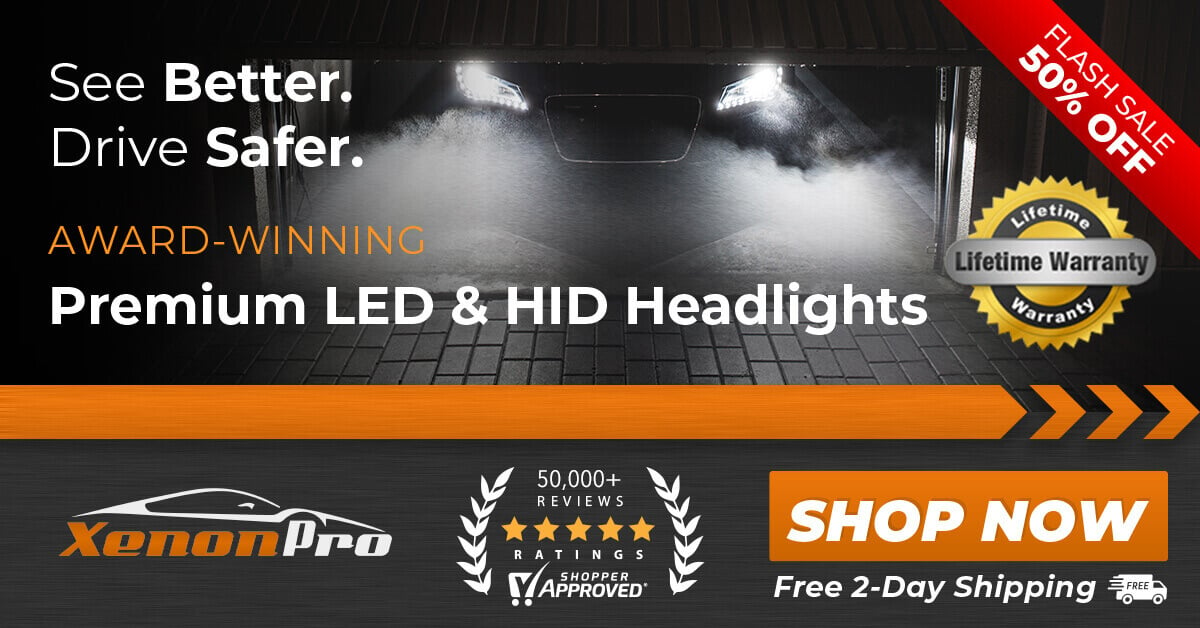
Sources:
- XenonPro.com Research
Disclaimer: The information contained on this page is provided free of charge to our visitors. It was prepared to the best of our abilities and with all the information available to us at the time of writing. We reserve the right to change, remove, or update any information contained on this page at any time and without notice to improve its accuracy. The most reliable method to determine the bulb size is by pulling your actual bulb(s) and reading the part number indicated directly on the bulb. The information compiled on this page comes with no guarantees or warranties.



